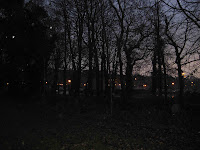
As a way of warming up to get back to the Irish Literary Revival, I thought I would stop in at the Blog. A huge gale has blown up out of the Atlantic and has been thrashing the western part of the island. Great buckets of rain and huge gusts of wind that shake the library and literally howl in the gutters. I walked to Jenny Wilhelms' house last night (lead singer of the band Gjarllarhorn (Anne, quick, go look it up gjallarhorn.com; you'll love this stuff)), and I put on my rainsuit for the 20 minute walk.
 When I arrived at her house, I sloshed onto the mat and dripped a huge puddle while I peeled off the outer layer, she laughed and said she had never seen someone so wet before. It reminded of another sopping Irish walk I made in Dingle once...anyway, today is the next day and it is still blowing away. So here I sit, at 4:00 in the already pitch dark afternoon, with my digestive biscuits and tea working methodically through the present tense of regular verbs in Irish.
When I arrived at her house, I sloshed onto the mat and dripped a huge puddle while I peeled off the outer layer, she laughed and said she had never seen someone so wet before. It reminded of another sopping Irish walk I made in Dingle once...anyway, today is the next day and it is still blowing away. So here I sit, at 4:00 in the already pitch dark afternoon, with my digestive biscuits and tea working methodically through the present tense of regular verbs in Irish. 
This Irish language class I am taking has really surprised me pedagogically. Because Irish is one of the two official languages of Ireland, it is not regarded as a foreign language but as a second language. Now, Gentle Reader, I assure you, this is a big theoretical deal because it has a lot to do with *how* the language is taught. One assumes in teaching a second language, that the language is all around the student in daily use so that the student is immersed in interaction using the language. One assumes in teaching a foreign language that the language is *not* around for constant input, and there is a more abstract relationship to the language. Ireland is a great place for conflict of policy and reality. Don't get me started on the Gaelic League or the Dance Commssion, but this interesting conflict in a 21st century language is sort of the child of those 19th and early 20th century institutions.
So, here is the 21st century, the European Union includes Irish as an official language of the EU, which is great institutional validity. As a result the EU Test of Irish competency is based on the assumption that Irish is a second language for people in Ireland. Therefore, the EU syllabus for the EU Test of Irish competency is what is known as a 'functional' and 'communicative' syllabus. The student studies how to interact in common social functions, learning the social formulas with a strong emphasis on speaking and listening. If one does any reading, it is in the context of the social situation. The only writing on the basic syllabus is to know how to fill out forms appropriately. So in class we memorize chunks and learn how to do role plays for business and simple social interactions. We know how to identify ourselves, (Ruth is ainm dom), say where we are from (Is as na Stait Aontaith me), where we live (Ta me i mo chonai i Lumneach), and what we do with our days (Sa trathnona, buailim le caidre sa teach tabhairne). But there is *no* grammar instruction. We learn chunks of language and where certain nouns and verbs can be inserted. Its a lot of memorization without rules.
When the class first started three months ago, I was totally at sea! I had *never* worked with a functional syllabus this way. I wanted rules! I wanted little texts to read, not computer dialogs to listen to. I desperately read the license plates (Lumneach, Baile Atha Cliath, An Clar, Tiobrad Aran) and the little signs on the shop doors (Isteach! Slan go foill!) Whatever. By now, what with all the memorization of chunks, I can speak my little piece about who I am, where I'm from, who I live with, what sports I play, and what I do on a usual day. Part of the final exam is to show a photograph and describe it. It is fascinating to me that I am able to say an awful lot, but I really couldn't tell you what, exactly, I am saying. I had always heard that the critic of the functional communicative syllabus was that you get people who can talk, but that's about all they can do. They can't really create with the language outside the functional categories in which they were instructed. So this is what that is like! I sometimes figure out why a word is the way it is, and it is really cool when I am able to intuit a grammar rule from all the variations that I have memorized. Maybe this is a good thing: if you memorize enough of the corpus of the language, then you have enough information to begin to figure rules out for yourself. Still, I would have liked a few grammar rules to help me along.
I imagine this would be easier or more effective, if, in fact, Irish really was a second language in Ireland. However, no matter what the policies say, Irish is actually a foreign language on much of this little island. There is no immersion going on here. One hears more Polish than Irish in this place, and in Dublin, one can substitute Italian for Polish. I have been to parts of the Gaeltacht where you can hear Irish in daily use, but it is an 'insiders' language. It is most certainly not used with 'outsiders' which would be the rest of the sasanach world. Therefore, unless one is attending these specialized 'Irish only' immersion courses in Dingle, you will not hear Irish being used in the normal second language way. It just doesn't work that way no matter what official policy might be.
So learning Irish using the functional communicative syllabus has been very interesting because I can really feel what this is like. I must say that as a language learner, I really prefer to have some generative grammar rules available to me so I can be a little creative with my language use rather than relying on sticking together different chunks in different orders. The latter might *sound* more fluent, but it is really quite limiting.
If you are interested in the EU functional communicative syllabus, they have a fantastic website with handouts and sound files at http://www.teg.ie



1 comment:
Thanks for the tip about the band...you know I'll definitely check them out. Just wondering if Jenny is in one of your classes?
I'd like to discuss this with you in more detail later, but it seems that the more people (as a whole) are the same, we are more different in our approach to education, entertainment, self expression and even drinking. I wonder if I'm interpreting this correctly from your blogs.
And speaking of drinking, a TV show just ended about Irish drinking tradition and brewing technique (ala Guinness and Irish Whiskey). Interestingly, a segment of the show discussed the drunken differences in behavior. A well traveled Irishman said that Americans tell everything about themselves when drunk, the Irish get very happy, and the Germans get too serious. Oh yeah?
Think I'll just raise a glass to your journey with a big ole' s**t eating grin on my face, with furrowed brows and after telling you all about my latest dream, quietly say "Sláinte!" And by that time, the ale' would have had time to settle. Looking forward to sharing some of that homebrew with you two.
Post a Comment